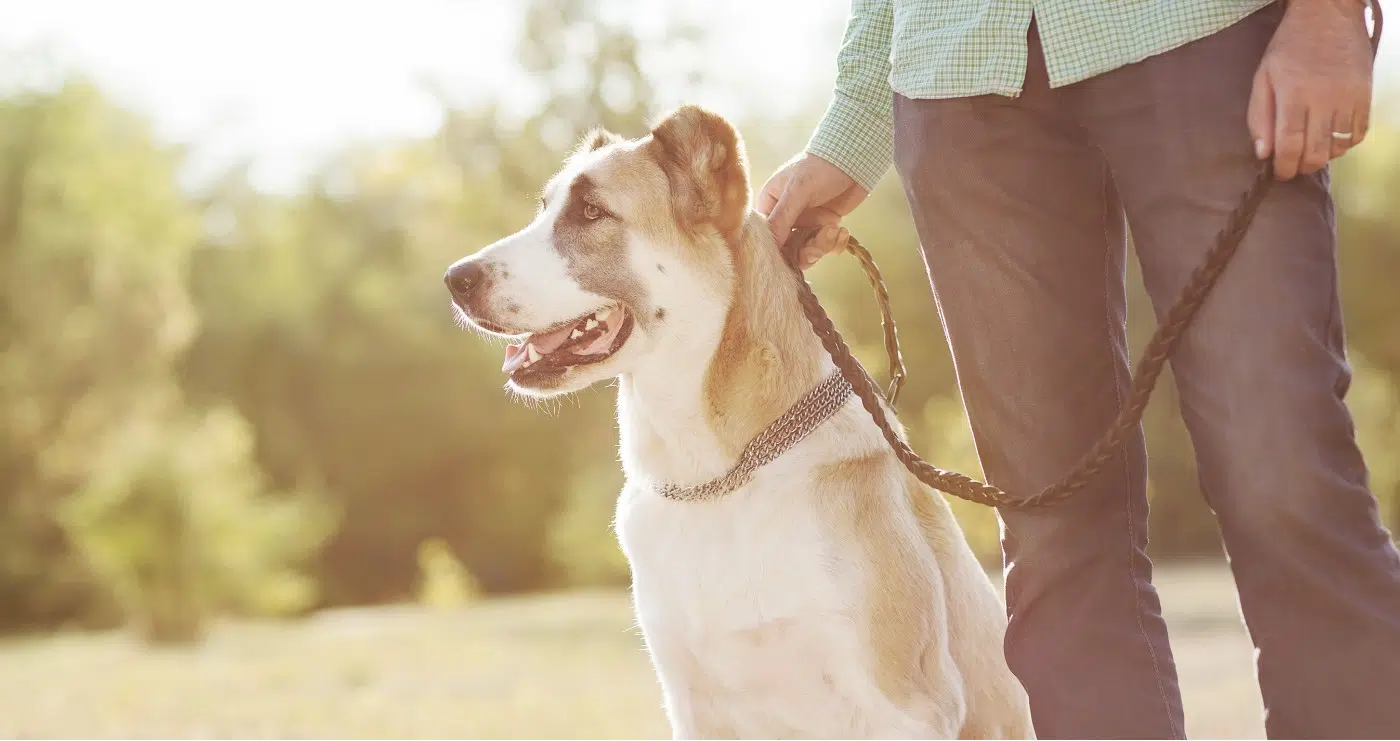Injured by someone else's dangerous animal?
Count on the Colonel. Learn your legal options

Dog bites can happen quickly, and they can have catastrophic effects. But what do you do when you or someone you love suffers a serious dog bite injury? It can be tempting to move on– especially if you know the dog owner or worry about what will happen to the dog.
However, not reporting a dog bite to authorities and animal control can have serious consequences.
The team at Karl Truman Law Offices helps dog bite victims and their families recover after an attack. In this article, we outline Indiana and Kentucky’s dog bite laws, and explain why it’s essential to report dog bites.
We love animals, but dog bite statistics are grim. People suffer about 4.7 million dog bite injuries each year in the United States, according to the Centers for Disease Control (CDC). And more than 1,000 people need emergency medical care to treat dog bite injuries each day.
Tragically, most dog bite victims are children, who are far more likely to sustain major injuries that require medical attention.
Dog bite laws vary from state to state. And irresponsible dog owners might face both criminal charges and civil liability if they do not protect people from their aggressive pets.
The dog bite lawyers at Karl Truman Law Office represent people in both Kentucky and Indiana. Here are the personal injury law essentials you need to know in each state.
In both Kentucky and Indiana, a dog’s owners might face fines and jail time if their animal attacks someone. Unlike a personal injury lawsuit, these laws aim to punish irresponsible owners—but they do not aim to compensate people for their injuries.
In Indiana, a dog’s owner is liable for dog attacks if they “knew or should have known” that it was likely to attack or bite someone. Sometimes called the “one bite” rule, this law protects responsible dog owners who legitimately had no idea that their pet was aggressive or dangerous.
However, the “one bite” rule is nuanced. A dog doesn’t really need to attack someone for an owner to know that they pose a risk. Other evidence that might support an Indiana dog bite lawsuit includes the following unprovoked behaviors:
This isn’t an easy analysis. For example, a barking dog is probably not enough evidence to prove that the dog was dangerous. However, if the dog had a history of lunging at people in a menacing fashion, that could support a dog bite lawsuit in Indiana.
If you’re not sure that you have a dog bite case, contact our law firm for a free, no-risk consultation.
Kentucky dog bite victims benefit from the state’s rigorous laws. Dog owners are strictly liable for the damage their dogs cause. That means that you can file a lawsuit and demand compensation for your injuries, even if the dog has never shown a history of aggression.
However, the state’s comparative negligence rules will still apply. So, if the injured person contributed to the incident (for example, by provoking the dog), their settlement would be reduced.
RELATED: Will I Get a Better Settlement With a Personal Injury Lawyer?

There are many reasons why you should report an aggressive or dangerous dog to the authorities.
When you do not report a dog bite, you are left without crucial documentation that would support a personal injury claim. While reporting a friend or neighbor’s dog may seem unnecessary, immediately doing so establishes a paper trail.
When you don’t notify the authorities and seek medical attention, you create additional challenges. An official report will be crucial evidence to help you recover the damages. Generally, a dog owner can use a lack of evidence to contest your claims, especially if the timeline of events or location cannot be established.
Additionally, there may be difficulties when seeking compensation from the dog owner’s insurance company, which may determine that your injury is not as severe as you claim due to not reporting the bite as evidence.
Many people are hesitant to report dog bites and attacks to authorities out of fear of what might happen to the dog. If you were bit by a familiar dog belonging to a friend or family member, you might be even more hesitant to report the incident. However, filing a police report helps state and local authorities enforce dog bite laws and may help prevent future attacks.
Reporting a dog bite to animal control and local authorities will trigger an investigation to determine if the dog is dangerous or vicious. If the dog is classified as dangerous, it is the owner’s responsibility to ensure that proper steps are taken to keep their dog from injuring other people. The owner may be required to:
These steps are implemented to ensure that the dog will not injure anyone in the future, and the process is focused on protecting others from future attacks.

Medical treatment can be extensive, especially if you need surgery, physical rehabilitation, or counseling for the trauma of the incident. Serious injuries from dog bites include:
In addition to the injuries you may receive from the bite, dogs are known to carry more than 600 different types of bacteria in their mouths. Although not all these bacteria can make a human sick, even the most minor bites can become infected with life-threatening diseases such as rabies, tetanus, and antibiotic-resistant MRSA (Methicillin-resistant Staphylococcus aureus).
If the injuries turn out worse than you expect, the damages can be costly. The Agency of Healthcare Research and Quality (AHRQ) has calculated that a dog-bite-related hospital stay averages around $20,000 a person and involves a stay of more than three days for rehabilitation. If you are facing unexpected medical bills and loss of work after a dog bite accident, filing a dog bite insurance claim or lawsuit may help you recoup those losses.

If someone needs emergency medical care, call 911 immediately. The sooner emergency medical services get to the injured person, the better. Emergency dispatch will usually send police and animal control to the scene as well.
The officers can help you file an incident report, which documents the circumstances around the dog attack. This document can serve as powerful evidence if you decide to file a personal injury claim.
Even if your injuries seem “minor,” you should take them seriously. While first aid treatments, like using pressure to stop bleeding and carefully cleaning bites and puncture wounds, can alleviate some issues, it’s best if you see a doctor.
Dog bites can easily become infected, and an antibacterial ointment alone might not solve the issue. And your injury might be more severe than you think—dog bites can cause nerve damage, scarring, disfigurement, and post-traumatic stress.
A doctor can address these issues, which might lead to faster and fuller recovery. And, if you suffered permanent harm, your medical records will help personal injury lawyers, judges, and juries understand the severity of your situation.
After a dog bite incident, you’ll want to preserve as much information as possible. That way, your lawyers and the authorities will have a clear picture of what happened and who is responsible.
Do your best to collect the following evidence:
Getting attacked and mauled by a dog is a traumatic experience. An experienced personal injury lawyer is skilled at establishing a solid case that will support the validity of your claim so you can focus on healing.

When you report a dog bite, animal control or the local police will investigate the dog’s history of biting and verify that the dog is up to date on vaccinations, including rabies. The health department and animal control will relay any concerns regarding the dog’s vaccination history and possible risk to your health.
After filing a police report, the dog owner is required to cooperate with the local health department’s investigations and recommendations, including quarantine procedures. When the dog is under quarantine, it is typically restricted to the owner’s home until a determination has been reached. Along with this restriction, the dog should not come into contact with another person to ensure that the dog is safely sheltered and cannot cause them harm.
In general, the dog owner is held responsible, not the dog. If the owner follows restrictions and the dog seems calm, the report will be filed without further action. Alternatively, if authorities find the owner does not follow the required regulations, they may place the dog in a shelter until a final determination is made. The dog will not be euthanized except in extreme circumstances such as viciousness, multiple attacks, or the death of a person.
If you or a family member have been injured in an attack by someone else’s dog, you have a right to claim compensation. Severe bites may require immediate medical attention, which can be even more extensive if the consequences are worse than you initially suspect. An experienced personal injury attorney can help you take the necessary steps and get maximum compensation for your dog bite claim.
If you live in the Louisville, Kentucky, or Jeffersonville, Indiana, areas and you or a family member was injured in a dog attack, please call our team at (502) 222-2222 or contact us to schedule your free consultation with an experienced personal injury attorney.
References
Nonfatal Dog Bite–Related Injuries Treated in Hospital Emergency Departments — United States, 2001. (2001). Centers for Disease Control & Prevention. Retrieved from https://www.cdc.gov/mmwr/preview/mmwrhtml/mm5226a1.htm
The content provided here is for informational purposes only and should not be construed as legal advice on any subject.
















Disclaimer: Kentucky does not certify specialties in legal fields. The personal injury law information on this website provided by The Karl Truman Law Office is not meant to be taken as formal legal advice. If you need to speak with a personal injury attorney in the Louisville, Kentucky, or Jeffersonville, Indiana areas please contact us today.This website is not intended for viewing or usage by European Union citizens.
Terms & Conditions for SMS communication: Karl Truman Law Office will use SMS communications to contact those that have inquired about our services which include all practice areas listed on our site. Attempts to contact will cease after one month unless a case is accepted and signed with the Karl Truman Law Office, in which case we will continue to utilize our SMS feature for appropriate communications. Should there be any questions or concerns about our SMS communications, please call our office at 502.222.2222 or email us at [email protected]. You may opt out of these communications at any time by reply with STOP. Message and data rates may apply.
